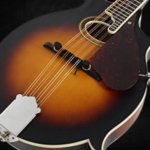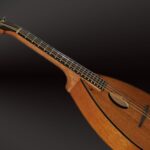The violin is one of the most popular instruments in the classical music canon, and thousands of composers have tried their hand at writing concertos for the instrument. The enormity of the genre can be overwhelming, so I hope that this guide will help you start your listening journey!
As a professional violinist and violist and teacher, I have performed, listened to, and taught hundreds of violin concertos. Naturally, I’ve developed favorites, and it should be noted that an article claiming to definitively list the “10 greatest concertos of all time” cannot help but be subjective.
Table of Contents
Below, you’ll find a list of my favorite concertos or those that I view as critical in the history of violin music and classical music history as a whole. I’ve also included my favorite recordings of each, and I hope you’ll give them a listen!
What Makes a Great Violin Concerto?
Violin concertos are as diverse as classical music itself, and there are many different aspects that can make a piece great. Because of the wide range of the violin and the emotional capacity of the instrument, violins are particularly suited for concertos because of their ability to cut through the density of the orchestral sound.
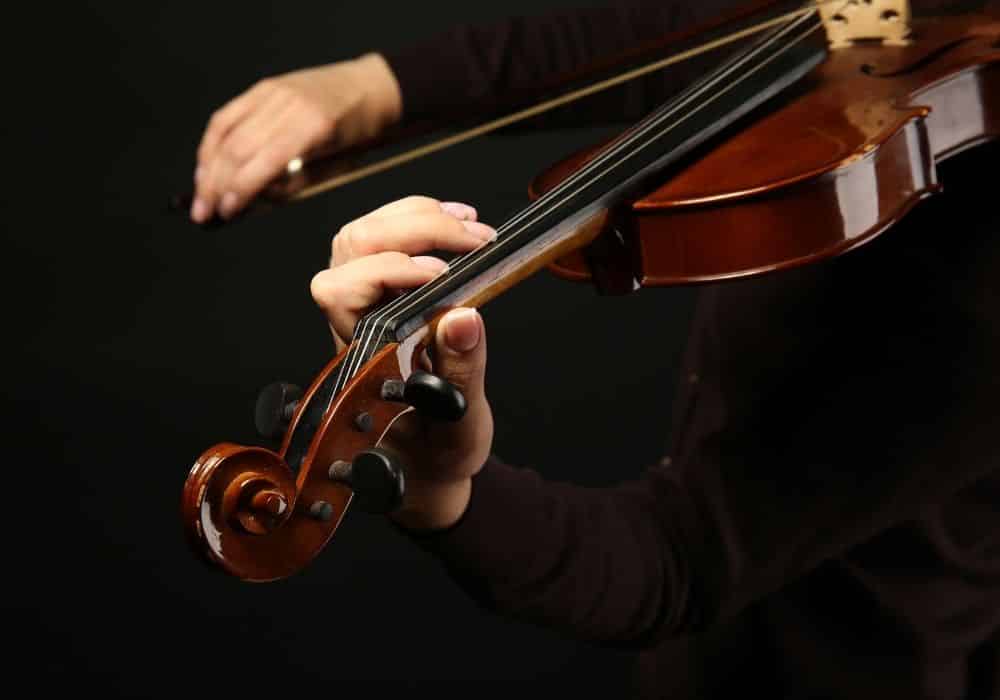
The most effective concertos utilize the emotive capacity of the instrument and tell a story. Below, you’ll find 10 of my favorites.
Time Periods of Violin Concertos
Composers have been writing violin concertos for all of modern classical music history, so there are examples from every significant era of classical music. Here are the five main time periods:
Baroque Period
The Baroque period spans from roughly 1600 to 1750 and marks the start of modern classical music history. Prominent composers from this period include Johann Sebastian Bach, Antonio Vivaldi, George Frideric Handel, Georg Philipp Telemann, Giuseppe Tartini, and Claudio Monteverdi.
Classical Period
Following the Baroque period, the Classical period marks a shift in classical music history and sets the foundation for all compositions that follow. The period spans from about 1730 to 1820, and significant composers include Joseph Haydn, Wolfgang Amadeus Mozart, Carl Philipp Emanuel Bach, Muzio Clementi, and Leopold Mozart.
Ludwig van Beethoven and Franz Schubert are considered to be transitional figures between the Classical period and the Romantic.
Romantic Era
Closely related to Romanticism, the intellectual, artistic, and literary movement that dominated the 19th century, the Romantic era in classical music is characterized by lush and expansive compositions that rebelled against the strict confines of the Classical and Baroque periods.
The period spans from roughly 1800 to 1910, and prominent composers include Ludwig van Beethoven, Hector Berlioz, Frederic Chopin, Felix Mendelssohn, Robert Schumann, Clara Schumann, Antonin Dvorak, Jean Sibelius, Sergei Rachmaninoff, and many others.
20th Century
The 20th century marked a significant expansion of the diversity of music, and genres and compositional techniques exploded and fractured. In classical music, the period was marked by experimentation and rejection of traditional norms.
Prominent composers include Richard Strauss, Edward Elgar, Claude Debussy, Maurice Ravel, Arnold Schoenberg, Igor Stravinsky, George Gershwin, Aaron Copland, Charles Ives, Terry Riley, John Cage, Phillip Glass, and many others.
21st Century
As classical music has receded in the popular psyche, composers have adapted and found creative solutions, including many genre crossovers and technological improvements. Prominent composers include Kaija Saariaho, Jennifer Higdon, Eric Whitacre, Nico Muhly, and Caroline Shaw.
See also: Best Violin Sonatas Of All Time
10 Best Violin Concertos
Below, you’ll find 10 recommendations for great violin concertos. I’ve chosen these based on their significance to the classical canon, their compositional quality, and the most important concertos for students.
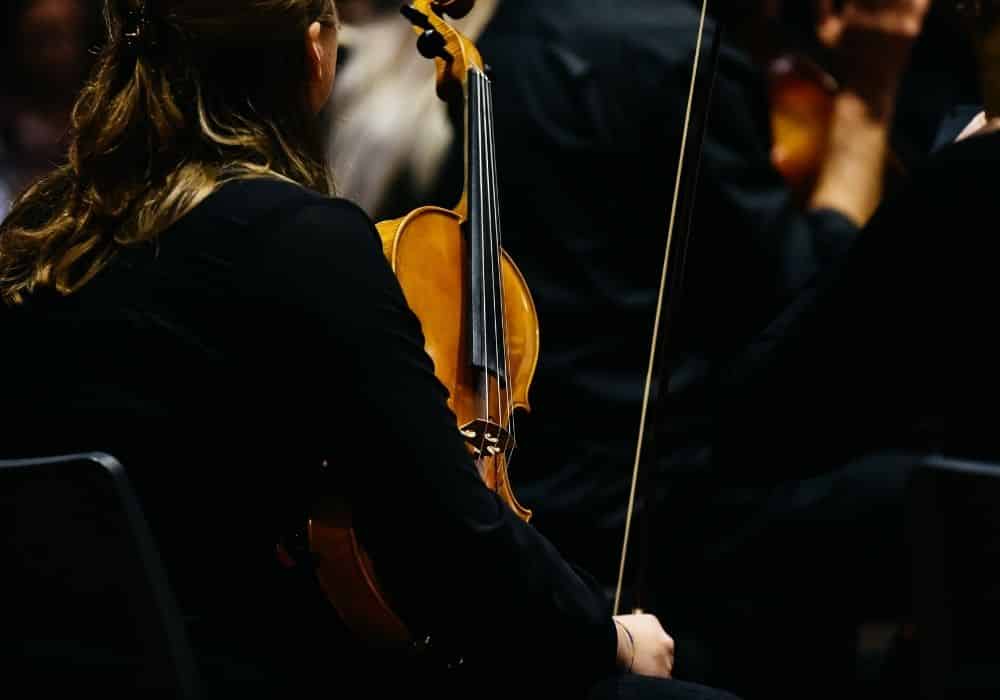
I also included my favorite recordings, and I hope you’ll give them a listen!
 1. Violin Concerto in D Major, Op. 61, Ludwig van Beethoven
1. Violin Concerto in D Major, Op. 61, Ludwig van Beethoven
- Musical era: Classical/Romantic periods
- Composer: Ludwig van Beethoven
- Year: 1806
- Favorite recording: Itzhak Perlman with Daniel Barenboim and Berliner Philharmoniker, 1992
Unlike much of his other work, Beethoven’s violin concerto was given little attention when it was first composed. In 1844, this all changed when the 12-year-old violinist Joseph Joachim gave a revival performance with the London Philharmonic Society orchestra, conducted by Felix Mendelssohn.
Since this revival, Beethoven’s concerto has become one of the most famous violin concertos in classical music history. It bridges the gap between the Classical and Romantic periods and was heavily influenced by the French style of composition from the time period. It’s notoriously difficult and requires incredible skill and mastery.
 2. Violin Concerto in D Major, Op. 77, Johannes Brahms
2. Violin Concerto in D Major, Op. 77, Johannes Brahms
- Musical era: Romantic period
- Composer: Johannes Brahms
- Year: 1878
- Favorite recording: Janine Jansen with Chamber Orchestra of Europe conducted by Bernard Haitink, 2013
Brahms continued in the tradition of Beethoven’s German violin concerto, writing a piece in the same key and dedicating the piece to the very same Joseph Joachim who gave the revival performance of Beethoven’s concerto. On the premier of Brahms’ concerto, in fact, Joachim insisted on beginning with Beethoven’s concerto and ending with the new work.
The concerto holds a position of reverence in the violin repertoire canon and is widely loved. It’s virtuosic, expressive, and incredibly beautiful. It’s the pinnacle of the genre. Beyond its position in classical music, the concerto also appears in the 2007 film There Will Be Blood and is sampled extensively in the 2004 Alicia Keys song “Karma.”
 3. Violin Concerto No. 5 in A Major, K. 219
3. Violin Concerto No. 5 in A Major, K. 219
- Musical era: Classical period
- Composer: Wolfgang Amadeus Mozart
- Year: 1775
- Favorite recording: Isabelle Faust and the musicians of Il Giardino Armonico conducted by Giovanni Antonini, 2016
Mozart’s violin concertos are a quintessential example of Classical era concertos and follow a relatively uniform fast-slow-fast, three-movement structure. These concertos, and particularly the 5th, are popular with students and professionals alike and require precise control of the instrument.
This piece is particularly important for students to know and eventually learn to play.
 4. Concerto for Two Violins in D minor, BWV 1043, Johann Sebastian Bach
4. Concerto for Two Violins in D minor, BWV 1043, Johann Sebastian Bach
- Musical era: Baroque period
- Composer: Johann Sebastian Bach
- Year: 1730
- Favorite recording: Isaac Stern and Itzhak Perlman with Zubin Mehta, 1980
Bach’s Concerto for Two Violins, colloquially known as the “Bach Double,” is one of Bach’s most popular works. It’s part of almost every violin student’s repertoire. While it’s technically far easier than works like Beethoven’s or Brahms’s concertos, the work is sophisticated and entertaining.
This is a long-time favorite for student concerto competitions, and it’s well worth your time to familiarize yourself with this piece.
 5. Violin Concerto in D major, Op. 35, Pyotr Ilyich Tchaikovsky
5. Violin Concerto in D major, Op. 35, Pyotr Ilyich Tchaikovsky
- Musical era: Romantic period
- Composer: Pyotr Ilyich Tchaikovsky
- Year: 1878
- Favorite recording: Julia Fischer with Orchestre Philharmonique de Radio France, with conductor Vasily Petrenko, 2013
Russian composer Pytor Ilyich Tchaikovsky’s violin concerto is one of the most popular violin concertos of all time. Although it was written in the same year as the Brahms concerto and in the same key (D major), this piece is quite different.
It was the only violin concerto written by Tchaikovsky, and it’s emblematic of the composer’s Romantic period compositional style. It’s a favorite of students and professionals alike.
 6. Violin Concerto No. 2, BB 117, Bela Bartok
6. Violin Concerto No. 2, BB 117, Bela Bartok
- Musical era: 20th century
- Composer: Bela Bartok
- Year: 1937-38
- Favorite recording: Augustin Hadelich, with conductor Vasily Petrenko and the Danish National Symphony Orchestra, 2017
Bela Bartok wrote two violin concertos over the course of his career, but only his second gained any recognition. The second concerto, written between 1937 and 1938 and premiered in 1939, was written in a difficult period of Bartok’s life, amidst growing concern for the rise of fascism in Europe.
The concerto is an essential work of 20th century music. It leans heavily on emerging compositional techniques, including 12-tone writing (a departure from the traditional tonal structure of the Classical and Romantic periods) and an expansion of the traditional concerto form.
 7. Violin Concerto in D Minor, Op. 47, Jean Sibelius
7. Violin Concerto in D Minor, Op. 47, Jean Sibelius
- Musical era: Romantic period/20th century
- Composer: Jean Sibelius
- Year: 1904
- Favorite recording: Sarah Chang with conductor Jaap van Zweden and the Radio Filharmonisch Orkest, 2011
Finnish composer Jean Sibelius’s violin concerto is largely considered to be his greatest work. Credited with helping to establish a Finnish national identity, Sibelius was a prolific composer of symphonic works and chamber music, and his violin concerto masterfully combines techniques from both.
Sweeping, emotional, and achingly beautiful, the violin concerto is an essential work in the violin canon and a favorite of professional soloists and students.
 8. Violin Concerto in E Minor, Op. 64, Felix Mendelssohn
8. Violin Concerto in E Minor, Op. 64, Felix Mendelssohn
- Musical era: Romantic period
- Composer: Felix Mendelssohn
- Year: 1844
- Favorite recording: Janine Jansen with conductor Riccardo Chailly and the Gewandhausorchester Leipzig, 2011
Mendelssohn’s violin concerto is one of the most popular concertos in history. The third of the most significant German concertos, along with Beethoven’s and Brahms’s works, Mendelssohn’s concerto is magical, lyrical, and thoroughly enjoyable.
This work is a popular choice for a student’s first “real” concerto, although it’s still performed by professionals frequently.
 9. Concerto in D, Wynton Marsalis
9. Concerto in D, Wynton Marsalis
- Musical era: 21st century
- Composer: Wynton Marsalis
- Year: 2019
- Favorite recording: Nicola Benedetti with conductor Cristian Macelaru and the Philadelphia Orchestra, 2019
Wynton Marsalis, the legendary jazz trumpeter, is best known for his extensive contributions to the world of jazz, but he’s begun to dip his feet into the world of classical music composition. Written for his friend and world-famous violinist Nicola Benedetti, the violin concerto is a masterful work.
The piece is based on organic connections between classical symphonic writing and jazz, African American poets and musicians, Scottish poets, and collaboration with Benedetti herself.
 10. Violin Concerto, Jennifer Higdon
10. Violin Concerto, Jennifer Higdon
- Musical era: 21st century
- Composer: Jennifer Higdon
- Year: 2008
- Favorite recording: Hilary Hahn and the Royal Liverpool Philharmonic Orchestra, 2010
Jennifer Higdon is a giant in 21st century composition, and her violin concerto is largely considered the most significant 21st century violin concerto so far. The concerto was written for Hilary Hahn and premiered by Hahn and the Indianapolis Symphony Orchestra with the conductor Mario Venzano on February 6, 2009.
Higdon’s concerto follows a traditional three movement structure and uses each movement to showcase different aspects of the violin’s capabilities. It was positively received by critics and audiences, and in 2010 it was the prize-winning composition for the Pulitzer Prize for Music.
Best Violin Concertos Composers
Many composers have tried their hand at the violin concerto, to varying results. As a professional musician and teacher, I consider these three composers to be the pinnacle of this genre.
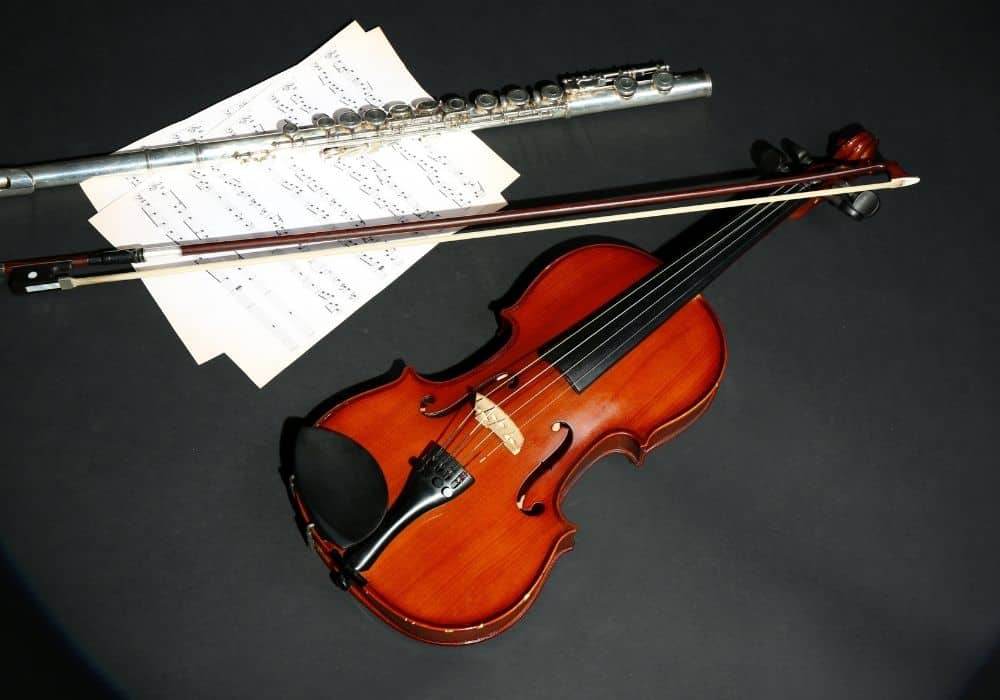
Johannes Brahms
Brahms’s violin concerto is unparalleled in its scope and artistry. I cannot remember a time hearing this piece when I wasn’t incredibly moved, and no work can compare to its depth of character and expression.
Ludwig van Beethoven
Beethoven’s violin concerto established the genre in the long term and cemented the violin as a prominent and essential instrument in classical music composition. Straddling the Classical and Romantic periods, Beethoven is a pivotal composer in the history of classical music, and his violin concerto is a significant contribution to music history.
Jean Sibelius
The Sibelius violin concerto is the third “must play” concerto in the violin repertoire. It’s a truly exceptional piece of art. While Sibelius is less well known than other classical composers, his violin concerto has risen to the top of the genre for good reason. This is a concerto that every violinist should know and study.
In Conclusion
The violin concerto has been a pillar in classical music for centuries, and nearly every prominent composer in the history of classical music has tried their hand at composing one. Because of its acoustic and expressive capabilities, the violin is uniquely suited to the concerto format, and the best composers are skilled at tapping into all of the instrument’s strengths and characteristics to make a piece that soars.
While most violin concertos follow a traditional three movement structure, composers throughout classical music history have adapted and pushed the boundaries of the genre to express their own unique compositional identities and styles. This list is an initial guide to the genre, and I hope that it will serve as a jumping-off point for your listening journey.













